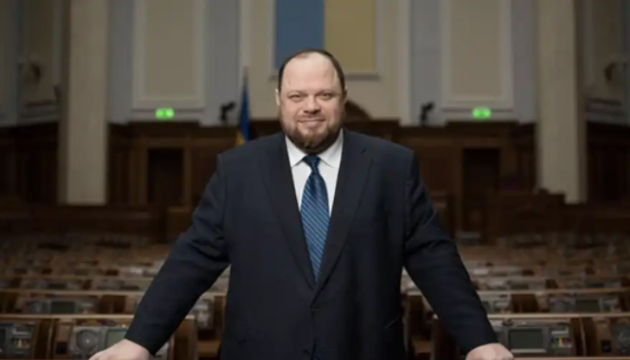Listen to the article
Russia Deploys AI Deepfakes to Undermine Ukraine’s Mobilization Efforts
Russian propaganda operations have escalated their disinformation campaign against Ukraine by deploying sophisticated deepfake videos and fabricated announcements aimed at undermining the country’s military mobilization efforts.
Security experts have identified a series of AI-generated videos circulating across multiple social media platforms, including Telegram, Facebook, X, and Instagram. The most prominent example features what appears to be Verkhovna Rada Speaker Ruslan Stefanchuk making inflammatory statements about Ukraine’s energy policies.
In the fraudulent video, the AI-generated “Stefanchuk” claims that due to Ukraine’s difficult energy situation, heating services will only be provided to families with men serving in Ukraine’s Defense Forces. The deepfake goes further, suggesting that wives of “draft dodgers” should “keep warm from their husbands” – language clearly designed to create social tension.
Technical analysis confirms the deceptive nature of the content. The AI-content detection service Hive Moderation identified the video as artificially created with a probability of 98.6%, confirming suspicions that it was entirely fabricated using deepfake technology.
Investigators traced the source to an anonymous Instagram account with minimal activity – just three videos, with the first uploaded on October 15, 2025. This pattern is consistent with Russian intelligence tactics of creating disposable social media accounts to disseminate propaganda while maintaining deniability.
In a parallel disinformation effort, Russian media outlets and Telegram channels have been circulating a fabricated recruitment notice allegedly from the city of Sumy. The counterfeit announcement claims that local military recruitment centers are offering food packages to women who report men evading military service – a tactic clearly designed to create distrust between Ukrainian citizens.
Officials from the Sumy Regional Recruitment and Social Support Center promptly debunked the forgery, noting several inconsistencies that expose its fraudulent nature. The center confirmed it has made no such announcements, does not use the abbreviation “RRSSC” seen on the fake poster, and maintains no record of such communications on its official channels.
This coordinated disinformation campaign represents a significant evolution in Russia’s hybrid warfare tactics against Ukraine. By targeting the country’s mobilization efforts, Moscow aims to weaken Ukraine’s defense capabilities without direct military engagement. The sophisticated use of AI technology indicates growing Russian proficiency in digital warfare techniques.
Security analysts note that these operations are part of a broader pattern of Russian information warfare aimed at fragmenting Ukrainian society during wartime. By creating artificial conflicts between citizens and authorities, the Kremlin hopes to undermine Ukrainian resilience and social cohesion.
This is not the first such attempt. Earlier disinformation campaigns included false claims about Ukrainian President Volodymyr Zelensky allegedly transferring $50 million monthly to a Saudi bank – another fabrication designed to foster public distrust in Ukraine’s leadership.
Ukrainian cybersecurity experts warn that as AI technology becomes more accessible, the public should expect increasingly sophisticated deepfakes that may be harder to detect. They recommend verifying information through official government channels and utilizing AI-detection tools when content appears suspicious.
International organizations monitoring disinformation have expressed concern about this escalation, noting that Russia’s deployment of AI-generated content represents a troubling new frontier in information warfare that could potentially spread to other conflict zones and democratic processes worldwide.
As Ukraine continues to defend against both physical and information attacks, authorities are working to develop more robust systems to quickly identify and counter such fabrications before they can influence public opinion or undermine national security efforts.
Fact Checker
Verify the accuracy of this article using The Disinformation Commission analysis and real-time sources.




12 Comments
Threatening to cut off heating services to families of draft evaders is an outrageous and inhumane proposal, even if it is just Russian disinformation. Ukraine should focus on upholding the rule of law, not punishing the vulnerable.
This seems like a cynical attempt by Russia to sow discord and undermine Ukraine’s mobilization efforts. Targeting civilians in this way is a low and desperate move.
The use of deepfake technology to spread disinformation is a worrying trend that needs to be addressed. Ukraine and its allies must remain vigilant and work quickly to counter these deceptive tactics.
This seems like a classic disinformation tactic to undermine Ukraine’s mobilization efforts. Using deepfake technology to spread false propaganda is a serious threat that needs to be addressed.
While I’m concerned about draft evasion, cutting off heating services is an unacceptably cruel response that would only harm innocent people. Ukraine needs to find more humane and lawful ways to address this issue.
While I understand the frustration with draft evasion, cutting off heating services is an unacceptably cruel response that would only harm innocent people. Ukraine needs to find more humane solutions.
I hope this is just more Russian propaganda and not something Ukraine is actually considering. Targeting civilians in this way would be a huge moral and strategic blunder.
The use of AI-generated deepfakes to spread disinformation is a worrying development. It’s crucial that Ukraine and its allies work to quickly identify and counter these kinds of deceptive propaganda tactics.
Absolutely. Fact-checking and public awareness campaigns will be key to limiting the impact of these manipulated videos. Maintaining public trust is critical during wartime.
Cutting heating services to draft evaders is an extreme and unethical measure. I hope this is just Russian propaganda and not something Ukraine is actually considering.
Agreed, such a policy would only serve to punish innocent civilians and families. Ukraine should focus on lawful methods to enforce conscription, not target the vulnerable.
The use of deepfake technology to spread this kind of inflammatory propaganda is deeply troubling. Ukraine and its allies must act quickly to identify and counter these deceptive tactics.